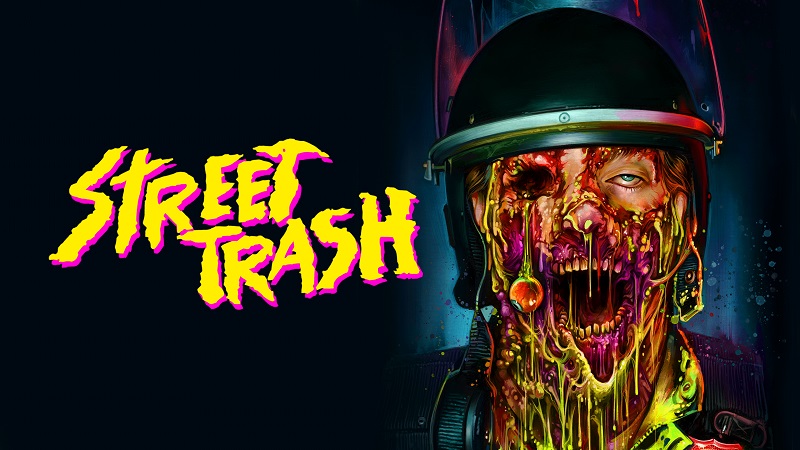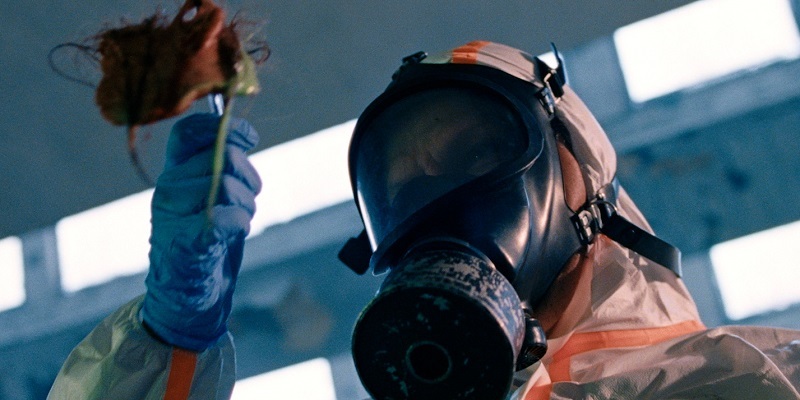
Review by
Benjamin Poole
Directed by: Ryan Kruger
Starring: Sean Cameron Michael, Donna Cormack-Thomson, Joe Vaz

J. Michael Muro and Roy Frumkes' original 1987
Street Trash achieved video store notoriety with its
hyperbolic/highly gross practical effects, colourful viscera and
pop-horror, becoming a progenitor of the "melt movie" subgenre; a mode
particularly tied to the VHS platform due to the technology's potential to
pause, replay and shot by shot revisit the melt movie's wonderfully
gratuitous dissolving of gloopy human flesh from rigid bone, re
The Blob and the bit when Emil gets run over in
Robocop (1988 and 1987 respectively, concurrent with
Street Trash). Reassessing the OG for this review of Ryan Kruger's (auteur of
2020's well-received
Fried Barry) contemporary reimagining, you're first struck by how striking the
camera work is, with Steadicam roaming across the grimy NY sidewalks of
the era, floating in and out of the stacks of demolition cars where the
hobo characters make their home (a Brooklyn location owned by Muro's dad).
Muro went on to become a renowned cinematographer and James Cameron's
Steadicam operator of choice, no less, and, despite screenwriter Frumkes
stating that he wrote the screenplay to "offend every group on the
planet," there’s an abiding sweetness to the film's peppy energy and
enthusiasm for itself. This is apparent not least of all in the film's
reference to social contexts: the homeless are recently minted Vietnam
vets whom society has turned its back on, a conceit heavily symbolised
when two drink the poison alcohol which will soon soften them into
technicolour slime upon the steps of a (real life) shut down hospital.
This cultural exploitation, which within the film reaches back to
Prohibition as the contraband booze was brewed in the 1920s, further
imbues Street Trash with an irresistible period Americana.
As you continue watching you're left lamenting a bygone age; the
beguilingly scuzzed New York of
Basket Case, of Taxi Driver, of
Larry Cohen; a loci which can never be recreated but which we all still long for.

I'm all for nostalgia (as you get older it's all you have), and not averse
to a horror remake either (tale old as time in this most reflective of
genres), and so sat down to Street Trash (2024) with an open
mind and heart (which was ready to be liquefied to the consistency of
Dulux paint). Shot in South Africa (which isn't very American) Kruger's
film begins by aping the original's would-be social commentary via upbeat
news channel footage of such issues as corporate greed, kids being
experimented on, and the world's last rhino being executed, etc. It's A
Lot, and the excess characterises the charmless overkill which is to
ensue. We're still with the unhoused, who likewise knock about in an
impressive junkyard, but the conceit here is that the dystopian Cape Town
council are actively experimenting their explosive substances on the
homeless in an attempt to get rid of them (there is an in-universe
reference to the "incident" of the earlier film for loose continuity).

An early problem of Street Trash (2024) is that these
supposed street lifers look scrubbed in a way that the grimy Brooklynites
of 1987 didn't. In that intense indie production, you could almost smell
the various body odours of that keen amateur cast working long and sweaty
hours. It unfortunately typifies the remake's Catch-22, where the polish
afforded by modern technology counters the soiled authenticity of 1980s
low-budget. Similarly, when we do see people melted to death in Kruger's
film, sequences take place under laboratory conditions, with set lighting
and arrangement disparate to the vivid location-based bursts of the
original (it may be impolite to draw such direct comparisons, but both the
title and mien of the recent movie haplessly invite it; as does its lovely
score by Ebenhaezer Smal, which invokes synthy VHSploitation).
While these scenes are impressively graphic, they stand as random cutaways
from the ongoing storyline of our ragtag group of unhoused: they just
"happen" and, per se, lack narrative impact. As for the protagonists
themselves, followed endlessly about the city causing/avoiding mischief
between "melts," we are positioned to find them funny, but as a typical
example of their dialogue consists of reciting slang terms for female
genitalia to each other ("penis fly trap, axe wound" etc), unless you are
a very young child/simple minded adult it is impossible to laugh along.

Our hero goes to sex addict groups to exploit an easy shag, before
attending narcotics anonymous to score; the sort of trajectories which
back then would be naively insolent but is all a bit tedious today (and
doesn't even make narrative sense because in a subsequent sequence we see
a couple of the gang cook drugs anyway). I know we're supposed to rub
along and not take this sort of thing too seriously - a caveat which
Street Trash (2024) artlessly trades on - but it just
seems so tiresome. Never mind melting you to a bubbling puddle of blue
paste, Street Trash (2024) will make you a dreary moralist.
The first Street Trash marvels with its audacious
inventiveness, and today its innocent desire to shock mainly induces
period affection (apart from the unpalatable racism). Things were
different in that tentative midnight movie era. Because in the same way
that, I dunno, those godawful Faces of Death films are
redundant in a time where you can't open social media without
inadvertently witnessing bombed citizens or a woman burning to death on
the subway, the glib nihilism of Street Trash (2024) too
seems commonplace; knowingly conformist to edge-lord posture rather than a
transgressive strike against hegemonic mores. To use a scatological pun
which the script would appreciate, it goes through the motions. Crazy
credits: a final scene features two male characters where the joke seems
to be that they have sex.

Street Trash is on UK/ROI VOD now.

